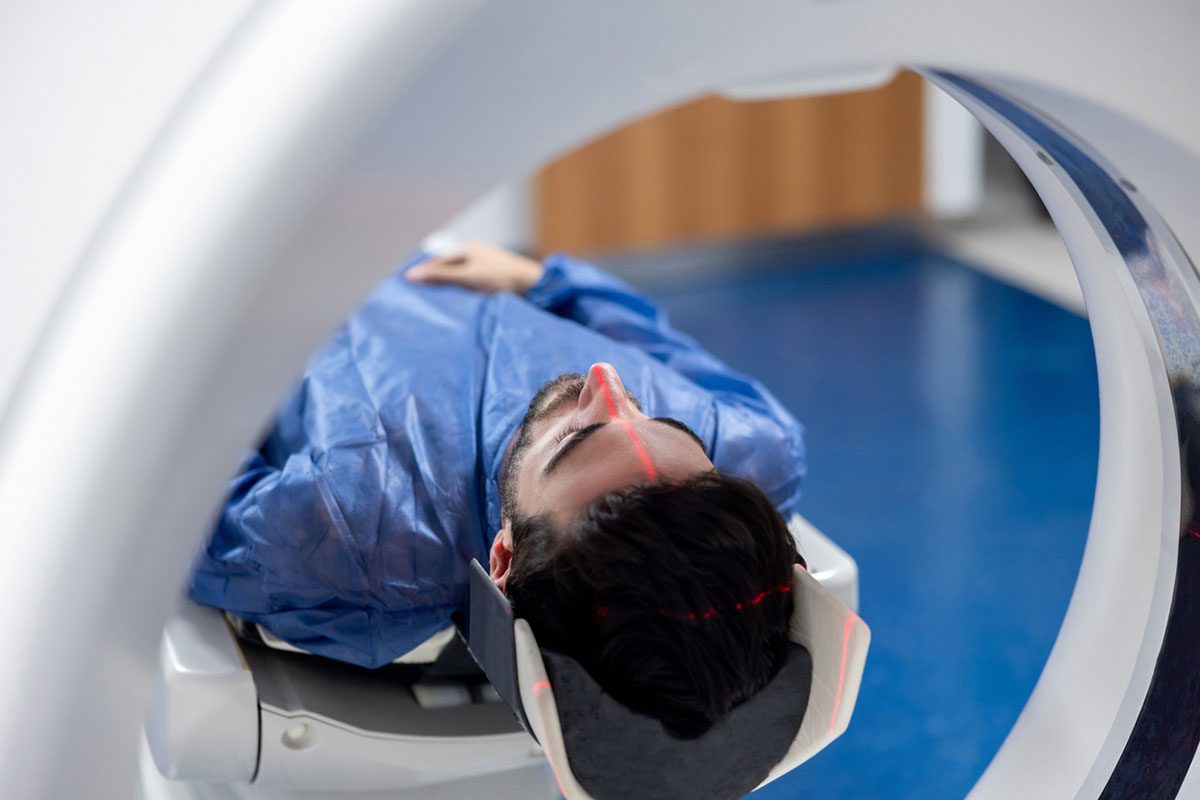Kleine-Levin syndrome is a rare neurologic disorder typically affecting young adult men and is characterized by episodes of hypersomnolence that can last for hours or even days with alternating episodes of hyperphagia, hypersexuality, and visual/auditory hallucinations.1 Kleine-Levin syndrome is an exclusionary diagnosis.2 A few investigators have reported good response to lithium, but many others believe that there is no effective treatment for this condition.3,4
Case Report
Mr A is a 34-year-old single Ashkenazi Jew who was diagnosed with a major depressive episode at the age of 20 years. Mr A was admitted to a closed psychiatric ward in a paranoid hallucinatory state after breaking into his sister’s home, threatening her, and attempting to steal her belongings.
During his initial evaluation, he expressed paranoid thoughts and reported hearing voices ordering him to hurt others. His drug screen was positive for 3,4-methylenedioxymethamphetamine and amphetamine. Quetiapine was initiated and titrated up to a dose of 400 mg/d for a suspected diagnosis of psychosis.
For several weeks, Mr A spent most of his time sleeping, refusing to change his clothes or attend to his personal hygiene. He only left his bed to eat, which he did to excess. He would not participate in group activities, and when staff tried to motivate him, he stereotypically responded, “I sleep to be alive; I was born to sleep.”
During the rare times when he did join other patients and staff in ward activities, he tried to hug or touch them. On 2 occasions, he touched another patient and then a social worker inappropriately, incurring the rage of his ward mates.
Several treatment regimens were tried, including first- and second-generation antipsychotics, with no significant improvement. After 6 months, his condition had not changed. Psycho-diagnostic tests were conducted, but owing to his limited cooperation and somnolence, it took 2 months to complete them. The results showed a gap between his well-developed verbal capabilities and his primitive executive functions, indicating a disinhibitory state and more importantly ruling out psychotic and affective disorders.
Mr A was transferred to a different ward, wherein examinations were repeated and revealed similar results. Antipsychotic drugs were stopped. He continued to sleep up to 20 hours a day in episodes that lasted from days to weeks. Even when the staff managed to get him out of bed, he would sleep in other beds, on the floor, or even on the ward’s lawn. The only thing that motivated him was food, and he was the first to come to the cafeteria, often fought others in queues, and occasionally snatched food from their plates. His alternating hyperphagic-hypersexual episodes and hypersomnic states along with the psycho-diagnostic test findings led the staff to challenge the anchoring bias, which suggested a chronic psychotic state.
A complete neurologic workup was conducted in cooperation with consulting neurologists, which included a complete blood count, cranial magnetic resonance imaging, electroencephalography, and video electroencephalography. These tests were noncontributory. After exclusion of secondary causes such as narcolepsy, temporal lobe epilepsy, Kluver-Bucy syndrome, and multiple sclerosis, Mr A was diagnosed with Kleine-Levin syndrome.
One year after his involuntary admission, Mr A was discharged to a community facility, where he continues to receive both psychiatric and neurologic care. At discharge, lithium was titrated to a dose of 600 mg/d.
Discussion
Kleine-Levin syndrome is a rare but underdiagnosed and mismanaged neurologic disease primarily presenting in adolescent males. A hypothalamic pathology is proposed, although brain imaging and serologic evaluation of blood, cerebrospinal fluid, and inflammatory markers have yet to conclusively determine possible etiologies.6 Kleine-Levin syndrome mostly has a benign course with ultimate disappearance of symptoms within 4 years of clinical onset.6 Mr A’s case is rather unique due to late onset7 and unremitting nature8 of the presentation. A year after discharge to a community facility, Mr A is still suffering from signs and symptoms of Kleine-Levin syndrome with little to no relief on lithium and carbamazepine.
This case highlights the overlapping symptoms of psychiatric and neurologic manifestations,9 demonstrates how alternative diagnoses can be overlooked, and is a prime example of the importance of multidisciplinary cooperation10,11 and of challenging an anchoring bias.
Article Information
Published Online: April 9, 2024.
https://doi.org/10.4088/PCC.23cr03633
© 2024 Physicians Postgraduate Press, Inc.
Prim Care Companion CNS Disord 2024;26(2):23cr03633
Submitted: August 28, 2023; accepted: December 22, 2023.
To Cite: Owiwi M, Argo D. Kleine-Levin syndrome in a closed psychiatric ward: a case of misdiagnosis. Prim Care Companion CNS Disord. 2024;26(2):23cr03633.
Author Affiliations: Jerusalem Mental Health Center, Jerusalem, Israel (Owiwi, Argo); Hebrew University, Jerusalem, Israel (Argo).
Corresponding Author: Mohannad Owiwi, MD, Jerusalem Mental Health Center, 1 Mete Yehuda, Jerusalem, Israel ([email protected]).
Relevant Financial Relationships: None.
Funding/Support: None.
Patient Consent: Consent was received from the patient to publish the case report, and information has been de-identified to protect anonymity.
References (11)

- Afolabi-Brown O, Mason TBA 2nd. Kleine-Levin syndrome. Paediatr Respir Rev. 2018;25:9–13. PubMed
- Ramdurg S. Kleine-Levin syndrome: etiology, diagnosis, and treatment. Ann Indian Acad Neurol. 2010;13(4):241–246. PubMed CrossRef
- de Oliveira MM, Conti C, Prado GF. Pharmacological treatment for Kleine-Levin syndrome. Cochrane Database Syst Rev. 2016 May 6;2016(5):CD006685. PubMed CrossRef
- Yao CC, Lin Y, Liu HC, et al. Effects of various drug therapies on Kleine-Levin syndrome: a case report. Gen Hosp Psychiatry. 2013;35(1):102.e7–102.e9. PubMed CrossRef
- Arnulf I, Lecendreux M, Franco P, et al. Le syndrome de Kleine-Levin [Kleine-Levin syndrome: state of the art]. Rev Neurol (Paris). 2008;164(8-9):658–668. PubMed CrossRef
- Arnulf I, Zeitzer JM, File J, et al. Kleine-Levin syndrome: a systematic review of 186 cases in the literature. Brain. 2005;128(Pt 12):2763–2776. PubMed CrossRef
- Edaki O, Khawaja IS, Schenck CH. An atypical case of Kleine-Levin syndrome. Prim Care Companion CNS Disord. 2019 Jan 10;21(1):18l02319. PubMed CrossRef
- Lavault S, Golmard JL, Groos E, et al. Kleine-Levin syndrome in 120 patients: differential diagnosis and long episodes. Ann Neurol. 2015;77(3):529–540. PubMed CrossRef
- Hesdorffer DC. Comorbidity between neurological illness and psychiatric disorders. CNS Spectr. 2016;21(3):230–238. PubMed CrossRef
- Cunningham MG, Goldstein M, Katz D, et al. Coalescence of psychiatry, neurology, and neuropsychology: from theory to practice. Harv Rev Psychiatry. 2006;14(3):127–140. PubMed CrossRef
- McLaughlin J, Young T. Neurology in the psychiatric patient: How to think about differentials in altered mental status and diagnoses not to miss. BJPsych Adv. 2022;28(4):226–238. CrossRef
Enjoy this premium PDF as part of your membership benefits!





